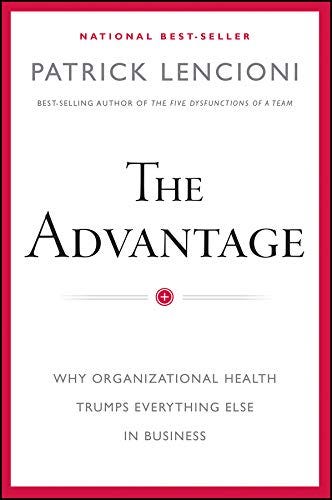Why Smart Organizations Don’t Always Win
In The Advantage, Patrick Lencioni explains that organizational health, not smarts or expertise, is a company's biggest competitive advantage.
Lencioni defines a healthy organization as one that is whole and consistent—meaning its management, operations, strategy, and culture make sense together. Just as a well-built structure has integrity, so too does a healthy organization.
Smarts in strategy, marketing, and finance, while critical, are areas where companies tend to over-index at the detriment of getting healthier.
According to Lencioni, an organization becomes healthy when it does four things well: builds an aligned leadership team, creates clarity, over-communicates clarity, and reinforces clarity.
Given the clear value of organizational health, what keeps leaders from building healthy organizations?
A bias towards complexity. Organizational health is simple. It’s so simple that business leaders take it for granted and assume that the answer to their problems needs to be more sophisticated. It’s easy to mistake simplicity with ease. So while organizational health is simple, it’s not easy. It takes courage and persistence to pursue and enforce it.
A bias for busyness. Rather than slowing down and focusing on what matters, most executives are frenetic and like to show that they’re doing stuff. The behavior of these leaders is a textbook case of mistaking busyness with impact.
A bias towards measurement. The saying “what gets measured, gets managed” taken to an extreme means ignoring critical business disciplines, like organization health, that can’t be measured easily or coherently. Conflating the measurability of something with its importance is a major fallacy. Clearly, there are many things that can’t be measured that matter a lot.
Organizational health, because it’s harder to measure, is undervalued at companies. Yet, counterintuitively, the competitive advantages to be gained from improving marketing, strategy, etc. are incremental given the speed at which industries change today. Being smart has become a commodity.
As Lencioni points out (and something my own experience confirms):
“...a lack of intelligence, domain expertise, or industry knowledge is almost never the problem I see in organizations. In twenty years of consulting to clients in virtually every industry, I’ve yet to meet a group of leaders who made me think, Wow, these people just don’t know enough about their business to succeed. Really. The vast majority of organizations today have more than enough intelligence, expertise, and knowledge to be successful. What they lack is organizational health.”
Organizational health precedes smarts because a healthy organization can’t help but get smart overtime. Healthy organizations identify problems fast, learn from their own mistakes and those of others, and scale learnings and successes across their orgs.
The cost of poor organization health is high. When an organization is unhealthy it has rampant politics, dysfunction, and bureaucracy.
At companies, poor health leads to wasted resources, time, employee turnover, and customer attrition. More broadly, unhealthy organizations create societal issues that bleed into people’s lives outside of the workplace.

